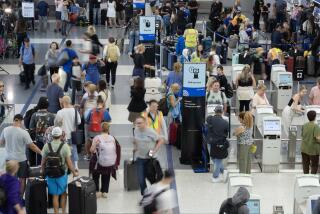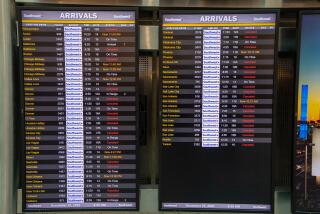China’s airlines take delays to the extreme
- Share via
SHANGHAI — Last month’s massive cancellations and weather delays by JetBlue Airways may have shaken American travelers. But China can top that -- and often does.
It doesn’t take much to roil the fast-growing aviation system here. Military drills can cause sudden flight disruptions. So can bad equipment. Cancellations sometimes happen at the last minute and for no obvious reason.
In an incident in Japan last month, Air China passengers went ballistic. Their frustration erupted into a skirmish between airline employees and passengers who were waiting to board a flight to Shanghai. The tussle turned the terminal at Osaka’s Kansai International Airport into a riot zone. And my family and I were there.
I had suffered my share of nightmarish experiences while flying on Chinese airlines, but nothing quite like this.
Passengers at Gate 29 shouted and chanted in Chinese, “We want to go home!” Many refused an offer to be bused to a hotel an hour away. Some people tried to block travelers boarding a different flight, setting off a scuffle.
One airline employee had his glasses snapped in half; another worker cowered in tears. Two dozen Japanese police were called to the scene.
It was midnight, nearly 12 hours after our scheduled departure. It would be another 12 hours before we got home.
We were a long way from the orderly lines, spacious waiting rooms and relatively docile passengers at Tom Bradley International Terminal at LAX.
As one of 167 passengers ticketed for Air China Flight 922, I empathized with the protesters. Travel within China and between it and other countries is booming because of the nation’s rapid economic growth and expanding middle class. China’s airline passenger traffic last year was estimated at 160 million, double the volume of five years ago.
My wife, our three children and I had spent several days in Japan to escape the crowds in Shanghai over the Lunar New Year holiday. Our flight back was supposed to leave at 1:15 p.m.
As minutes turned into hours and questions multiplied, there were no straight answers.
Most of the passengers were Chinese. Like farmers who had their land seized, they wanted some justice. They felt they had been misled -- at best ignored -- and had no recourse but to voice their complaints loudly. Chinese consumers have become increasingly willing to do that.
Until recently there’s been little competition in China’s airline industry, and it shows in the way the leading carriers -- all of them government-run -- often treat their passengers.
“They are not afraid of losing customers, and they don’t even care because it is state-owned,” said Liu Guangcai, associate professor at the Civil Aviation University of China in Tianjin.
For example, smoking theoretically is not allowed on China airlines. But don’t believe it. I’ve been on a number of flights in which I smelled cigarette smoke in the cabin and complained to attendants. I was politely ignored.
On Feb. 21, thick fog shrouded Beijing and other northern Chinese cities. Dozens of flights were delayed or canceled. Our aircraft was to fly to Osaka from Beijing, about a 2 1/2 -hour flight away.
At 6 p.m., the airline’s manager in Osaka told us our aircraft was in line to take off from Beijing. “Absolutely you’ll be leaving tonight,” he told us.
I didn’t see him again until midnight, when he emerged, red-faced, after passengers demanded to see an Air China official.
He couldn’t explain what had happened. But it was clear that the carrier had made no effort to reroute passengers on several other flights.
Instead, Air China prepared $8 meal coupons, but it didn’t make sure all the passengers got them.
When officials finally pulled the plug on the flight, they didn’t hand out travel vouchers. They made arrangements instead for bus transportation to a hotel. Some passengers decided it would be better to sleep at the terminal.
My family and I went to
the hotel after 2 a.m. We were awakened at 7 a.m. and told to check out by 9:30 for a 10:30 a.m. flight.
It wasn’t until 11 a.m. -- almost 22 hours after our scheduled departure -- that we left Osaka.
Not everything about flying in China is bad. I’ve enjoyed some great bargains, such as a $12 fare from Wenzhou to Shanghai on private Spring Airlines. Airport check-in lines usually move faster than in the U.S. You don’t have to take off your shoes or give up your toothpaste along the way.
But frequently I’ve had troubles in Chinese skies.
Like last April, after a long late-night flight from western China to Shanghai. With the lights of our destination in view as we approached the airport, the Shanghai Airlines jet suddenly pulled up. For the next 15 minutes, the plane swerved at low altitude, diving and rising, as passengers gasped and heaved.
At one point, I pressed the call button for a flight attendant. Someone came promptly and turned it off but didn’t stop to take my question. At 1:29 a.m. I turned on my cellphone and sent a text message to my wife: “We have a problem in the air. Pls pray. I love u.”
Moments later, the aircraft stopped circling and was rerouted to another Shanghai airport 40 miles away. After we landed, there were no apologies, no rides for passengers. Most of us were shaken, weary and silent. But a few screamed at the airline manager on duty.
A week later, I found out the problem: Not weather, a pilot familiar with the situation said. There was a glitch with the airport’s ground radar.
Long delays are no rarity. I had another all-nighter last August. It was on a China Southern evening flight bound for Hanoi. When midnight approached, the carrier took us to a nearby hotel but never told us when our flight would leave.
At 1:30 a.m., the airline called and told me the flight would be leaving in an hour or so. I washed up, lugged my bags through security checks in the wee hours and boarded the aircraft. I must have looked like a zombie.
When I got to my hotel in Hanoi, it was 6 a.m. -- three hours before my morning meeting.
It was a two-hour flight that turned into a 10-hour disaster. We weren’t totally stiffed during the long wait, though. Everybody got a box of crackers and a bottle of water.
Lee has been The Times’ Shanghai correspondent since 2004.
More to Read
Sign up for The Wild
We’ll help you find the best places to hike, bike and run, as well as the perfect silent spots for meditation and yoga.
You may occasionally receive promotional content from the Los Angeles Times.







